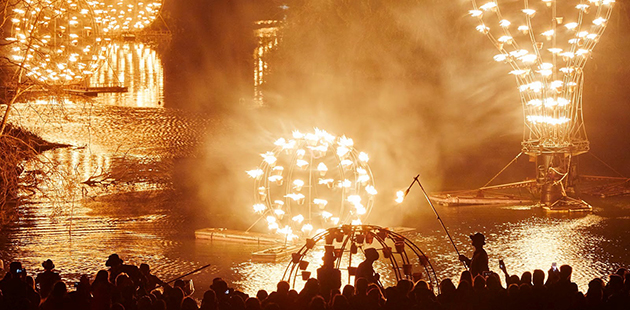 The 33rd annual Melbourne International Arts Festival came to a close yesterday (Sunday 21 October) after 19 days of dance, theatre, visual arts, architecture, contemporary and classical music, and free events across the city. From show-stopping world premieres to family friendly events, the 2018 program drew huge crowds from Melbourne and beyond.
The 33rd annual Melbourne International Arts Festival came to a close yesterday (Sunday 21 October) after 19 days of dance, theatre, visual arts, architecture, contemporary and classical music, and free events across the city. From show-stopping world premieres to family friendly events, the 2018 program drew huge crowds from Melbourne and beyond.
Nearly 30,000 Festival-goers witnessed the fiery transformation of Royal Botanic Gardens Victoria in the hugely popular Fire Gardens. Staged over four phenomenal nights by French artists Compagnie Carabosse, an extraordinary 85% of attendees were new to the Festival. A further 10,000 people ran away with the circus as UK company NoFit State’s Lexicon took up residency in the Gardens for the entire Festival.
Around 25,000 people were drawn to 1000 Doors – a visceral labyrinth of entrances and exits created by Melbourne-based installation artists Christian Wagstaff and Keith Courtney as a reprisal to their wildly popular House of Mirrors at last year’s Festival.
For the second year in a row, the Festival’s box office surpassed $3M in revenue under the artistic directorship of Jonathan Holloway, which is only the third time this milestone amount has been achieved in the Festival’s 33-year history. While final figures are still to be tallied, the 2018 box office is set to be in excess of $3.7M, breaking all previous Festival box office records.
“This year’s Festival was about extremes. From the loud, fiery, brilliance of Compagnie Carabosse’s Fire Gardens to William Forsythe’s sublime choreography, which had us revelling in the sheer quality of silence,” said Artistic Director, Jonathan Holloway.
“We saw ground-breaking performances which demanded our attention and captured our imagination. From the unavoidable confrontation in Belarus Free Theatre’s Trustees to the soul-stirring awe of Lagrime san di Pietro, audiences were spirited to new worlds. We are absolutely thrilled to have broken all previous Festival box office records.”
In keeping with Holloway’s history of commissioning new work the 2018 program featured six world premieres. One Infinity – a cross-cultural and cross-disciplinary work bringing together Australian and Chinese dancers and musicians opened to critical acclaim in the final week of the Festival, and Western Australia’s leading children’s theatre company Barking Gecko premiered a heart-warming adaptation of Gabrielle Wang’s award-winning children’s book A Ghost in My Suitcase in an all Chinese-Australian cast.
The program featured 12 Australian premieres, including the visually sensational dance-opera Layla and Majnun, which brought together the artistic talents of choreographer Mark Morris and the legendary Silkroad Ensemble. Following its debut at Sadlers Wells in London, William Forsythe’s latest work A Quiet Evening of Dance premiered at the State Theatre to standing ovations and four and half star reviews.
The boundaries of theatre were examined with Australian premieres of Vox Motus’s award-winning production Flight, a performance with no actors, and Curious Directive’s Frogman, which involved the audience through special use of virtual reality.
Audiences were enthralled by the world’s foremost Beckett interpreter Barry McGovern in Watt and mesmerised by Dickie Beau’s lip-sync mastery in Re-Member Me. Jimi Bani brought his barrier-breaking performance My Name is Jimi to Melbourne for five moving performances and La Boite Theatre and Rawcus reprised their critically acclaimed shows Prize Fighter and Song for A Weary Throat respectively.
The city’s thirst for ground-breaking contemporary music was quenched with sold-out performances from pioneering Japanese composer Ryuichi Sakamoto and experimental electronic artist Alva Noto, as well as the Berlin-based composer Nils Frahm, who added a second performance to his tour by popular demand.
The sounds of cult UK band The The brought the city back to the eighties with post-punk icon Matt Johnson performing hits from the band’s renowned albums Soul Mining (1989) and Infected (1986) for the first time in thirty years. And original members of The Go-Betweens reunited to perform their seminal album 16 Lovers Lane along with special guests Paul and Dan Kelly, Romy Vager, Laura Jean, Jen Cloher and more.
World premiere exhibitions of Polly Borland and Eva Rothschild and one-off performances from Mike Parr and Steven Rhall made up a varied visual arts program that spanned the mediums of photography, sculpture, sound installation, painting and performance.
Eight new Melbourne Art Trams were unveiled, including a recreation of the late modernist painter David Larwill’s hand-painted tram from 1986, which was photographed and wrapped on modern tram in recognition of the original Transporting Art program from 1978 – 1993.
Capping off this year’s public program, the MPavilion, designed by Barcelona-based architect Carme Pinós, hosted a suite of free events including the Festival’s closing concert Our Place Our Home, which celebrated Melbourne’s diverse cultures in musical form. A fitting end to a Festival that began with Tanderrum a ceremony performed by the First Peoples of Melbourne, which welcomed international artists and audiences to this year’s Festival.
The 2019 Melbourne International Arts Festival will be held from 2 – 20 October 2019. For more information, visit: www.festival.melbourne for details.
Image: Fire Gardens – photo by Sarah Walker
